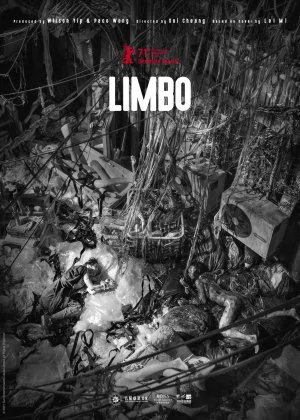Limbo

There used to be a time when the announcement of a new Pou-Soi Cheang film was something to be excited about. In the past decade or so, that feeling eroded almost completely, as Cheang was too preoccupied satisfying his box office hunger. Still, something of his former self must have lingered deep inside, Limbo [Ji Chi] is more than a simple return to form. Cheang mixes elements of the typical Hong Kong police procedural with classic noir influences and sets a new standard, not just within his oeuvre, but for an entire genre of films.
![screen capture of Limbo [Ji Chi]](/thumbs/img/articles/1200xauto/limbo-1.webp)
Cheang was one of those young Hong Kong talents, bursting onto the scene in the early/mid '00s. Contrary to what came before, his signature was dark, gritty and visceral. Not just stories spiced with a little action and crime, but films that demanded to be felt and experienced. Cheang really raised the bar when he directed Dog Bite Dog, but success and talent rarely go unnoticed in Hong Kong. Not much later he was too busy adapting Journey to the West for the big screen (for the umpteenth time, only now as a gaudy CG crapfest), seemingly a talent lost forever.
With Limbo, Cheang returns to his roots, revisiting the inflammatory underbelly of Hong Kong's society, almost literally dredging up the dirt as the lead characters stampede around the shadier parts of town. In many ways, Limbo is a straightforward police procedural that doesn't deviate too much from the norm, except that the lawless setting, the relentless characters and the raw emotional presentation give the film a unique character that easily distinguishes itself from its peers. It's certainly a nice change of pace, as Hong Kong cinema can at times be a bit too clean and polished for its own good.
Will is a young detective, fresh out of the police academy. He is coupled with Cham Lau, a veteran cop who doesn't mind getting his hands dirty if the need arises. The city is dealing with a serial killer, who leaves body parts scattered all over town. Will and Chan lead the investigation, calling in the help of Wong To, who acts as their informant. Wong and Cham share a troubled history, but they need Wong to infiltrate deep into the underground drug network of Hong Kong. There they find lingering evidence of a homeless man who fits the profile of the killer.
![screen capture of Limbo [Ji Chi]](/thumbs/img/articles/1200xauto/limbo-2.webp)
I'm not a very outspoken fan of black and white cinematography, but when done right (read tuned to make the most of high contrast black and white) it's definitely something I can appreciate. Cheang and cinematographer Siu-Keung Cheng (a Johnnie To regular) more than raised the bar with Limbo. I don't think I've ever seen a film with such high visual density. Coupled with the sharp, detailed finish, high contrast and dark blueish monochrome highlights, it makes for some absolutely spectacular images. It's almost impossible to know where to look first, but pretty much every single frame is worth exploring. A truly magnificent look for a film like Limbo.
The soundtrack is also pretty nifty, but that may not be too big of a big surprise knowing that Kenji Kawai was hired to do the score. Kawai brings some of his Mamoru Oshii magic to Limbo. Not that the score is at the same level of Kawai's best Oshii collaborations, but the ethereal and somewhat eerie music is certainly very fitting, giving Limbo more than just visual flair. It's really nice to witness this in a Hong Kong film, since they're generally not too bothered with well-developed scores. If anything, it's just more proof that a fitting soundtrack is one of the easiest and cheapest ways to elevate a film.
Hong Kong fans are sure to recognize Ka Tung Lam as one of the leads. He is one of those familiar Hong Kong faces who are rarely offered a principal part, it's no surprise then that he grabbed this opportunity with both hands and delivers one of his best efforts to date. The true discovery of Limbo is Yase Liu though. Her performance is truly riveting, balancing a cracked emotional core with an insatiable will to survive. Mason Lee is probably the weakest of the leads, but still comes off pretty decent, Hiroyuki Ikeuchi for his part shines as the villain, though his onscreen presence is rather limited.
![screen capture of Limbo [Ji Chi]](/thumbs/img/articles/1200xauto/limbo-3.webp)
Structurally, Limbo is very basic. The film sticks firmly to the conventions of the procedural, with two cops and an informant submerging themselves into the Hong Kong underground, little by little closing in on the serial killer. Cheang's trash-filled depiction of Hong Kong's seething underbelly is very inspired though, unflinching in its portrayal of a city that has lost control of its excesses, with all the dirt and grease slowly spilling over into the civilized parts of society. Looking at the way China is quickly seizing control over Hong Kong's cinematic output, this may very well be one of the last Hong Kong films to do so.
Limbo is one of those films that adds strong directorial influences to a solid genre foundation. At its core, it's a very basic genre film, but the exquisite styling, haunting soundtrack and involved performances make it an enthralling ride that lets the film transcend its genre roots. If Limbo proves anything, it's that Pou-Soi Cheang hasn't lost his touch just yet. Limbo is his grittiest, meanest and most badass film to date, a welcome reminder that Hong Kong is capable of more than just slickly produced genre cinema. It's anyone's guess though where Cheang will go from here.